Act I
Scene 1
A squarein Seville
In the guard house, Moralès and his soldiers are discussing the passers-by. Micaëla arrives, looking for the corporal Don José. Moralès explains that José isin another company that is due to take over the guard. Micaëla decides not to wait and departs. The officer Zuniga and José leadin the new guard, accompanied by a horde of children. Moralès tells José that Micaëla was asking for him.
It is break-time at the factory nearby and the women come out to smoke and flirt with the young men. Carmen is among them. She talks of love (L’amour est un oiseau rebelle), that it is elusive and inconstant. The bell rings, signalling the break is over. Carmen, desirous of catching José’s attention, throws him a flower. Enraptured, he quickly hides it.
Micaëla returns, bringing José a letter from his motherin which she asks him to return to marry Micaëla.
Uproar suddenly breaks outin the factory and the women pour into the square, accusing Carmen of drawing a knife on her friendin a quarrel. José is sent to question Carmen, but she refuses to answer. Zuniga orders José to take her to prison. Carmen starts to captivate José and tries to persuade him to release her. Forbidden to speak, she sings, contriving to arrange a rendezvous with him at Lillas Pastia’s tavern. He agrees to free her only if she will love him. She promises to do so, José frees her and is subsequently himself arrested.
Scene 2
Lillas Pastia’s tavern
Carmen, Frasquita and Mercédès are entertaining gypsies and soldiers. Zuniga tells Carmen that José, demoted and jailed for a month for aiding her escape, has just been released. A crowd is heard outside acclaiming the victorious toreador Escamillo, who enters followed by a throng of admirers. He returns Zuniga’s toast, drinking to his health, and describes the exhilaration of fighting a bull. Carmen immediately captures his attention but she shows no interest. Everyone leaves.
The smugglers Remendado and Dancaïro arrive; they are about to depart and ask Carmen, Frasquita and Mercédès to help them carry their wares. Carmen refuses: she isin love and waiting for José. Mockingly, the smugglers suggest José joins their band. Don José arrives. Carmen dances for him. When a signal is heardin the distance, summoning him back to his barracks he prepares to leave. Furious, Carmen accuses him of not loving her. In response he describes his passion and how, whilein prison, he treasured the flower she threw at him when they first met. As proof, Carmen insists he deserts and goes with her to the mountains. Zuniga unexpectedly appears; he has come to meet Carmen. When he sees José he orders him back to the barracks. Zuniga and José fight over Carmen. The smugglers runin and separate them; then they tie up Zuniga and Dancaïro shoots him. Having refused to obey orders, José realises he has no choice other than to join the smugglers.
Act II
Scene 3
In the mountains
The smugglers are examining their goods. They have stopped for a short rest. Carmen and José are there too. Carmen senses that José would be prepared to kill her if she left him. Frasquita and Mercédès read their fortunes with cards. They see a prosperous future. Carmen joins them. But however much she shuffles the cards, only death is foretold. Dancaïro and Remendado return. The gypsy women leave, having been instructed to distract the customs officers who are blocking the smugglers’ path. José is left to guard the contraband goods.
Having overcome her fear, Micaëla arrives. She is looking for José. A shot frightens her and she hides. It was José firing at an intruder — Escamillo. The toreador explains that he is pursuing Carmen, having heard that she no longer loves her soldier. The enraged José reveals himself and the rivals start to fight. Carmen stops them. Escamillo thanks her and invites everyone to his next bullfightin Seville and leaves. Crazed with jealousy, José threatens Carmen. The smugglers find Micaëlain her hiding place. She has come to beg José to return to his mother. Carmen urges him to go. Micaëla then reveals that José’s mother is dying and wants to forgive him. He agrees to accompany Micaëla.
Scene 4
Outside a bull-ringin Seville
A crowd has gathered outside the bull-ring prior to the bullfight. As they arrive, the participants of the corrida receive a rapturous reception. Escamillo appears, with Carmenin his wake. Frasquita and Mercédès warn Carmen that José is following her, hiddenin the crowd. However, she decides to wait and talk to him. All depart to watch the bullfight. José appears and pleads with her to return to him. She remains unyielding, she loves the toreador. The crowd ecstatically greets Escamillo. Mad from suffering he plunges a dagger into her. The crowd rejoice at the toreador’s victory.
Place: Seville, Spain, and surrounding hills
Time: Around 1820
Act 1
A square, in Seville. On the right, a door to the tobacco factory. At the back, a bridge. On the left, a guardhouse.
A group of soldiers relaxes in the square, waiting for the changing of the guard and commenting on the passers-by ("Sur la place, chacun passe"). Micaëla appears, seeking José. Moralès tells her that "José is not yet on duty" and invites her to wait with them. She declines, saying she will return later. José arrives with the new guard, who is greeted and imitated by a crowd of urchins ("Avec la garde montante").
As the factory bell rings, the cigarette girls emerge and exchange banter with young men in the crowd ("La cloche a sonné"). Carmen enters and sings her provocative habanera on the untameable nature of love ("L'amour est un oiseau rebelle"). The men plead with her to choose a lover, and after some teasing she throws a flower to Don José, who thus far has been ignoring her but is now annoyed by her insolence.
As the women go back to the factory, Micaëla returns and gives José a letter and a kiss from his mother ("Parle-moi de ma mère!"). He reads that his mother wants him to return home and marry Micaëla, who retreats in shy embarrassment on learning this. Just as José declares that he is ready to heed his mother's wishes, the women stream from the factory in great agitation. Zuniga, the officer of the guard, learns that Carmen has attacked a woman with a knife. When challenged, Carmen answers with mocking defiance ("Tra la la... Coupe-moi, brûle-moi"); Zuniga orders José to tie her hands while he prepares the prison warrant. Left alone with José, Carmen beguiles him with a seguidilla, in which she sings of a night of dancing and passion with her lover—whoever that may be—in Lillas Pastia's tavern. Confused yet mesmerised, José agrees to free her hands; as she is led away she pushes her escort to the ground and runs off laughing. José is arrested for dereliction of duty.
Act 2
Lillas Pastia's Inn
Two months have passed. Carmen and her friends Frasquita and Mercédès are entertaining Zuniga and other officers ("Les tringles des sistres tintaient") in Pastia's inn. Carmen is delighted to learn of José's release from two months' detention. Outside, a chorus and procession announces the arrival of the toreador Escamillo ("Vivat, vivat le Toréro"). Invited inside, he introduces himself with the "Toreador Song" ("Votre toast, je peux vous le rendre") and sets his sights on Carmen, who brushes him aside. Lillas Pastia hustles the crowds and the soldiers away.
When only Carmen, Frasquita and Mercédès remain, smugglers Dancaïre and Remendado arrive and reveal their plans to dispose of some recently acquired contraband ("Nous avons en tête une affaire"). Frasquita and Mercédès are keen to help them, but Carmen refuses, since she wishes to wait for José. After the smugglers leave, José arrives. Carmen treats him to a private exotic dance ("Je vais danser en votre honneur ... La la la"), but her song is joined by a distant bugle call from the barracks. When José says he must return to duty, she mocks him, and he answers by showing her the flower that she threw to him in the square ("La fleur que tu m'avais jetée"). Unconvinced, Carmen demands he show his love by leaving with her. José refuses to desert, but as he prepares to depart, Zuniga enters looking for Carmen. He and José fight, and are separated by the returning smugglers, who restrain Zuniga. Having attacked a superior officer, José now has no choice but to join Carmen and the smugglers ("Suis-nous à travers la campagne").
Act 3
A wild spot in the mountains
Carmen and José enter with the smugglers and their booty ("Écoute, écoute, compagnons"); Carmen has now become bored with José and tells him scornfully that he should go back to his mother. Frasquita and Mercédès amuse themselves by reading their fortunes from the cards; Carmen joins them and finds that the cards are foretelling her death, and José's. The women depart to suborn the customs officers who are watching the locality. José is placed on guard duty.
Micaëla enters with a guide, seeking José and determined to rescue him from Carmen ("Je dis que rien ne m'épouvante"). On hearing a gunshot she hides in fear; it is José, who has fired at an intruder who proves to be Escamillo. José's pleasure at meeting the bullfighter turns to anger when Escamillo declares his infatuation with Carmen. The pair fight ("Je suis Escamillo, toréro de Grenade"), but are interrupted by the returning smugglers and girls ("Holà, holà José"). As Escamillo leaves he invites everyone to his next bullfight in Seville. Micaëla is discovered; at first, José will not leave with her despite Carmen's mockery, but he agrees to go when told that his mother is dying. As he departs, vowing he will return, Escamillo is heard in the distance, singing the toreador's song.
Act 4
A square in Seville. At the back, the walls of an ancient amphitheatre
Zuniga, Frasquita and Mercédès are among the crowd awaiting the arrival of the bullfighters ("Les voici ! Voici la quadrille!"). Escamillo enters with Carmen, and they express their mutual love ("Si tu m'aimes, Carmen"). As Escamillo goes into the arena, Frasquita and Mercedes warn Carmen that José is nearby, but Carmen is unafraid and willing to speak to him. Alone, she is confronted by the desperate José ("C'est toi ! C'est moi !"). While he pleads vainly for her to return to him, cheers are heard from the arena. As José makes his last entreaty, Carmen contemptuously throws down the ring he gave her and attempts to enter the arena. He then stabs her, and as Escamillo is acclaimed by the crowds, Carmen dies. José kneels and sings "Ah! Carmen! ma Carmen adorée!"; as the crowd exits the arena, José confesses to killing the woman he loved.


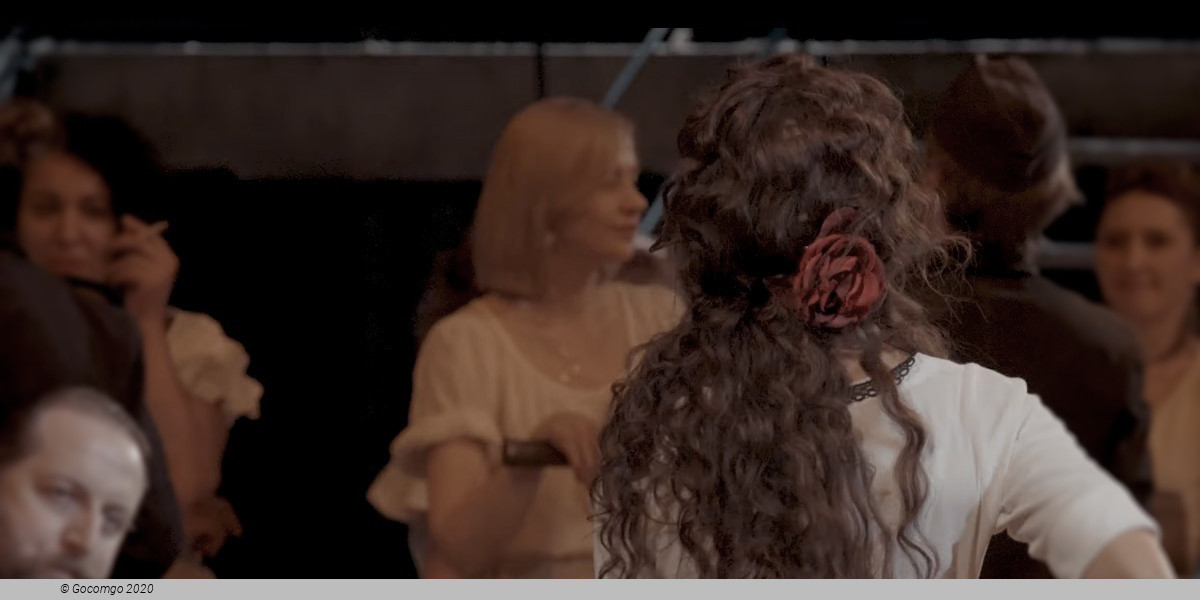
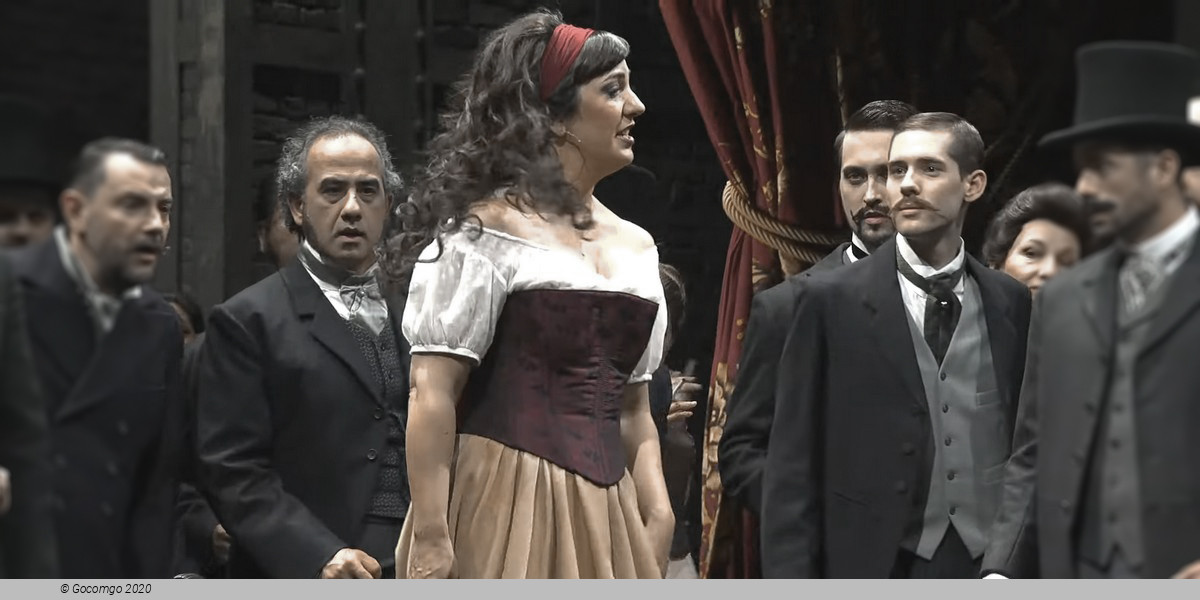
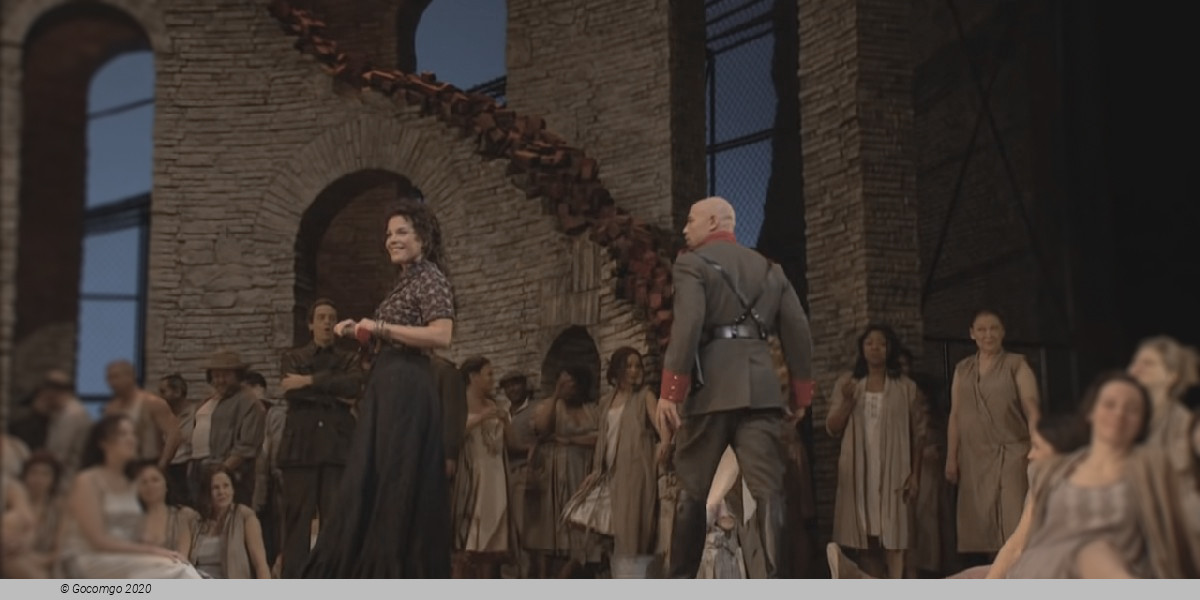
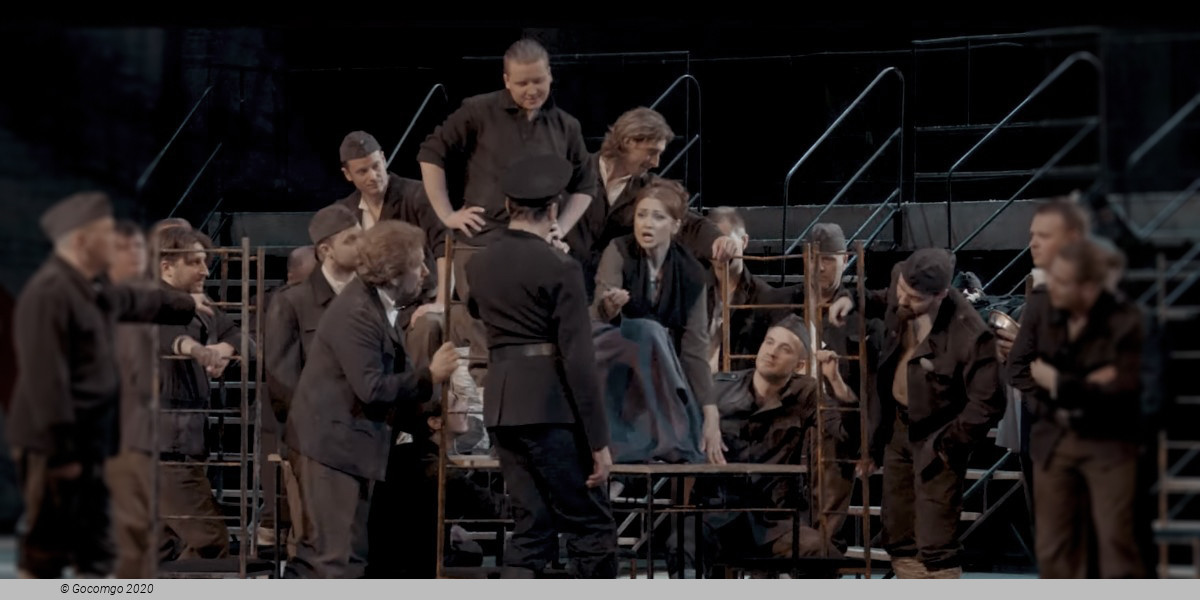
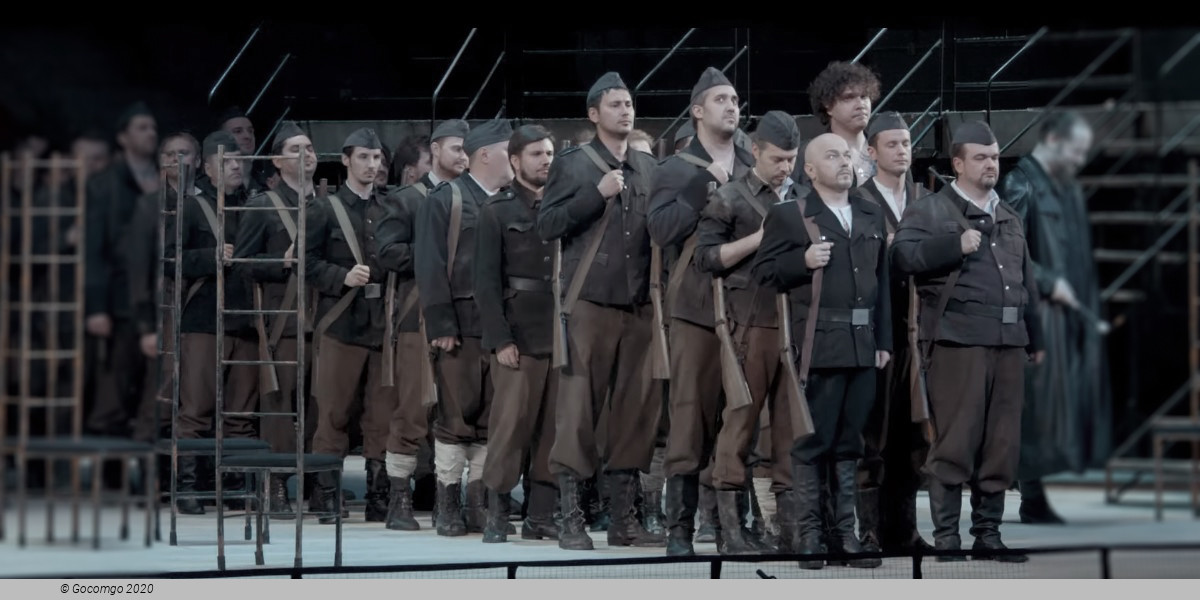
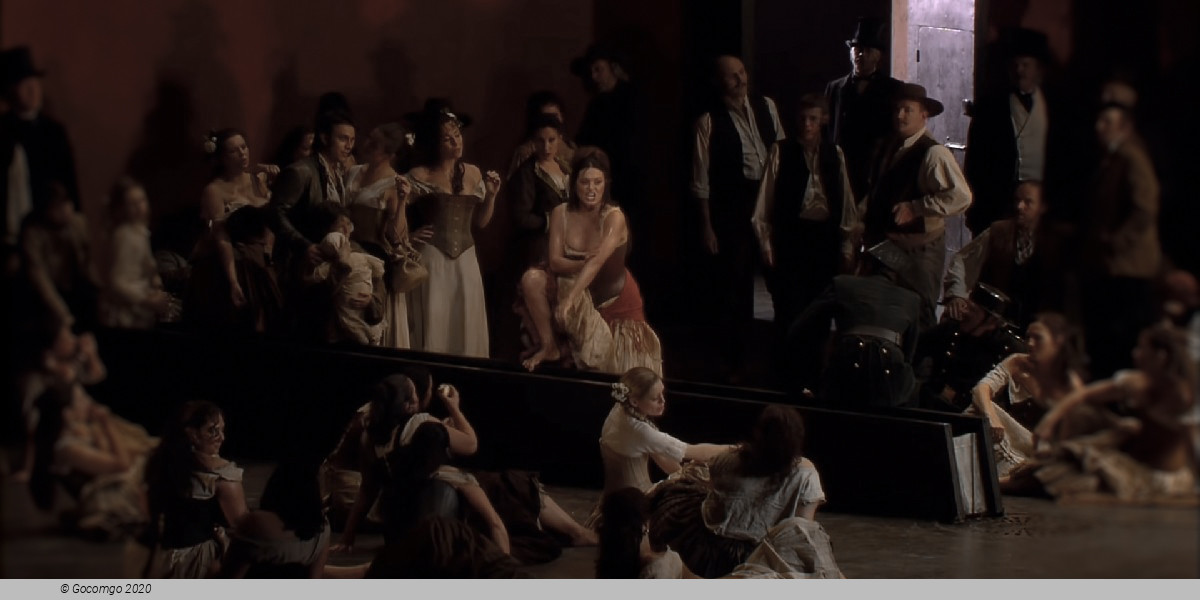
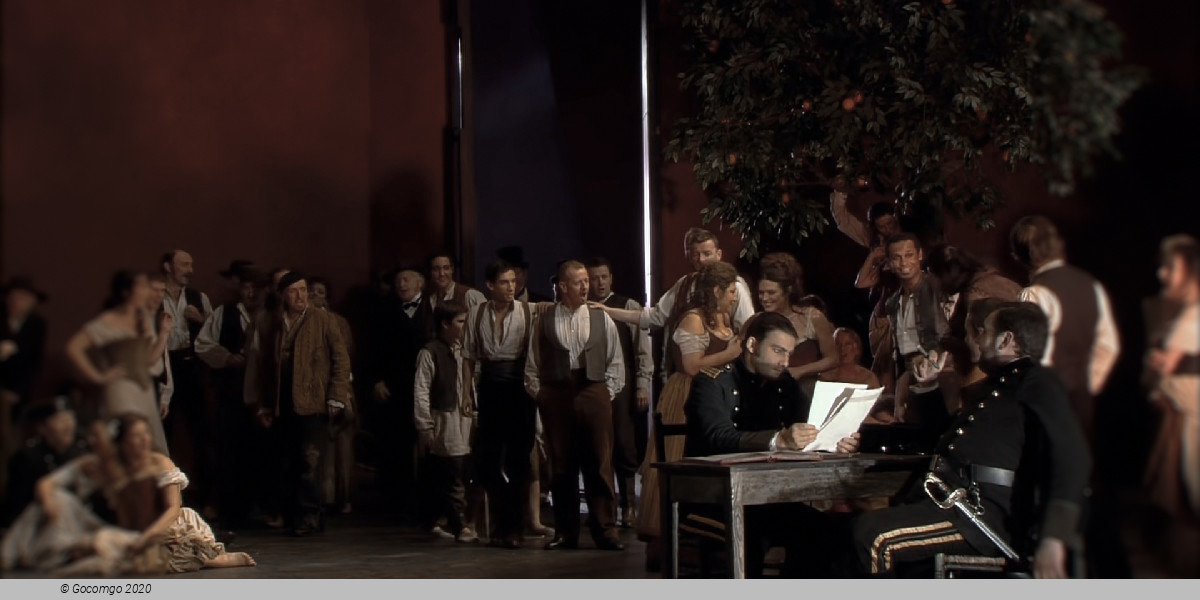
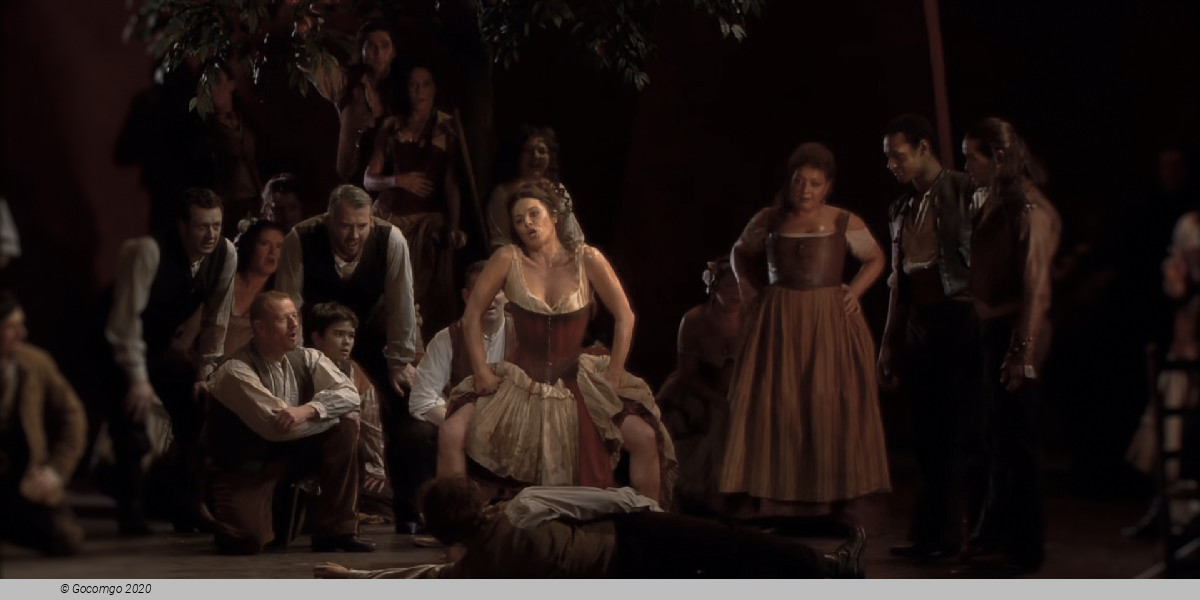
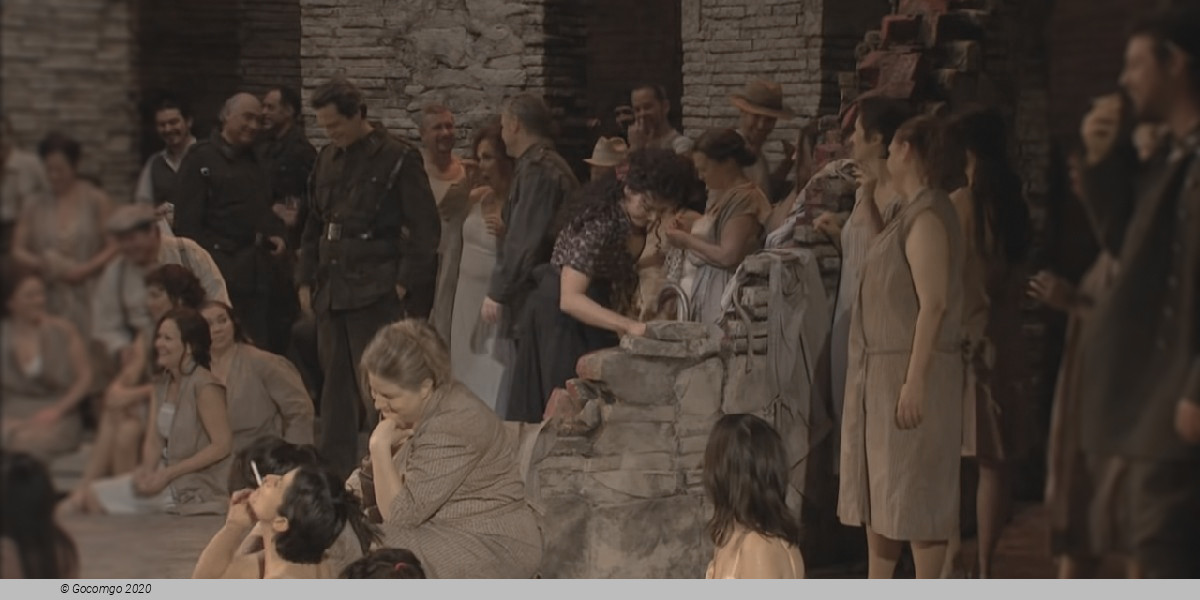
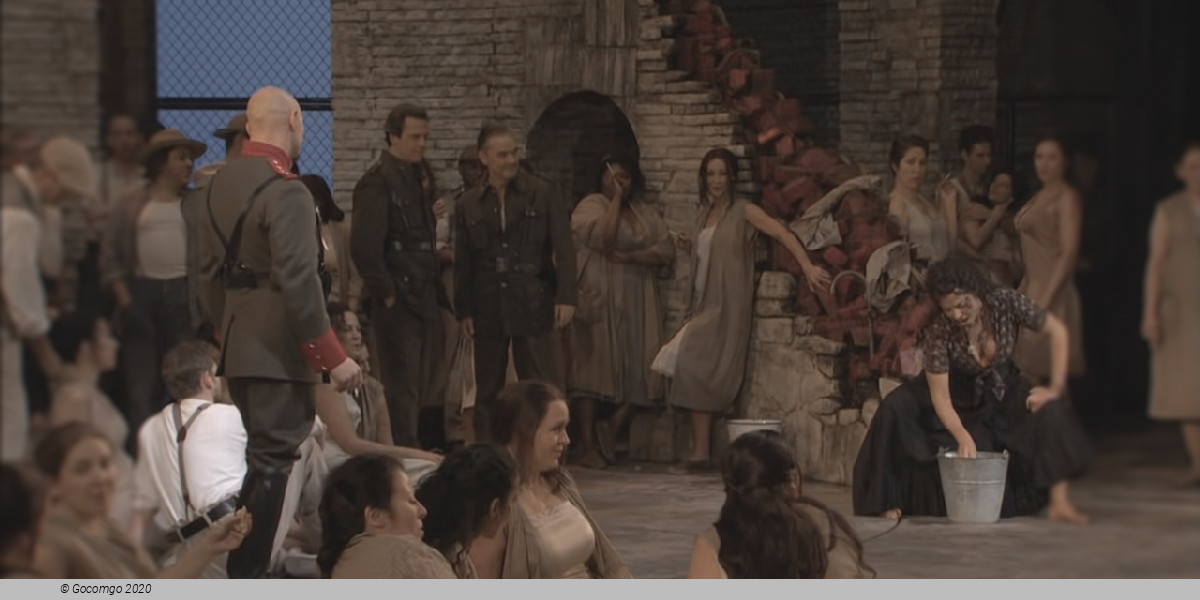
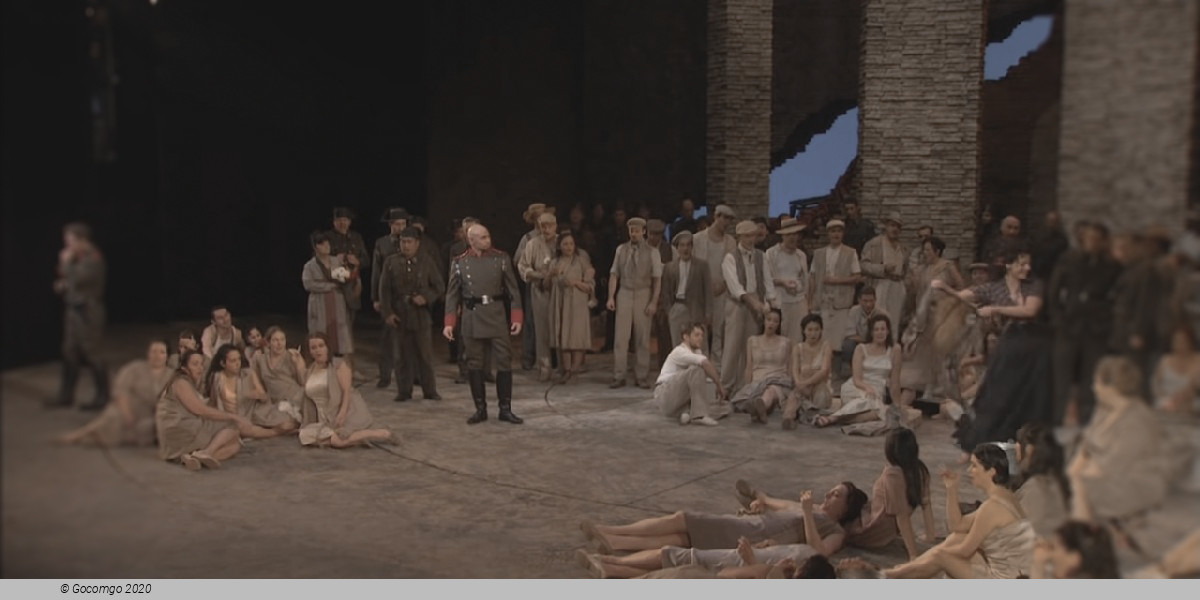
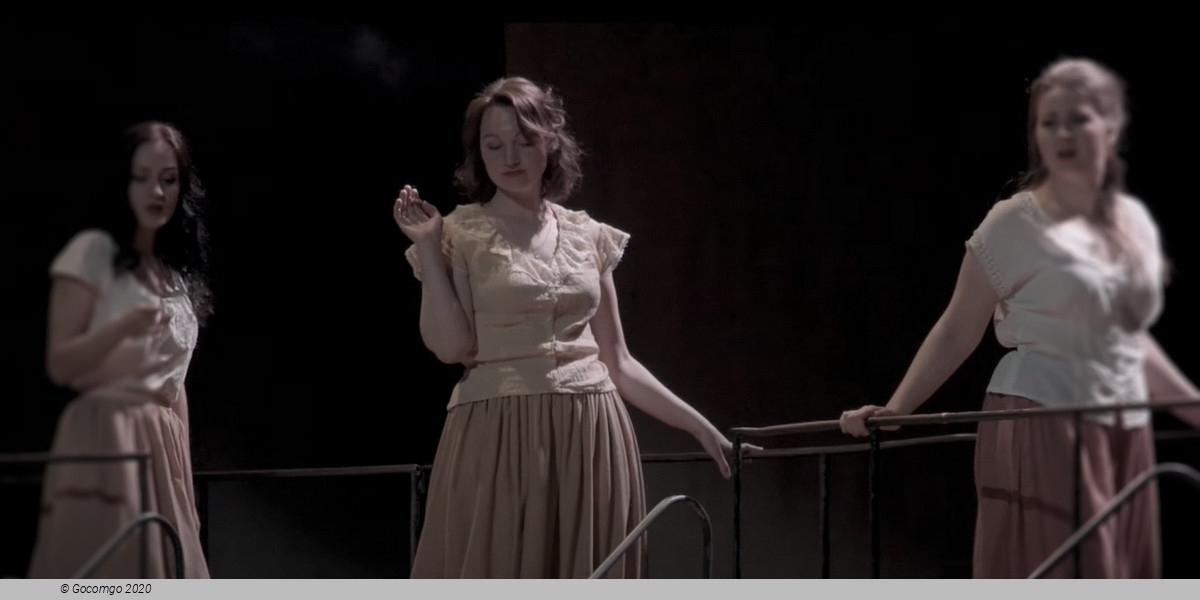
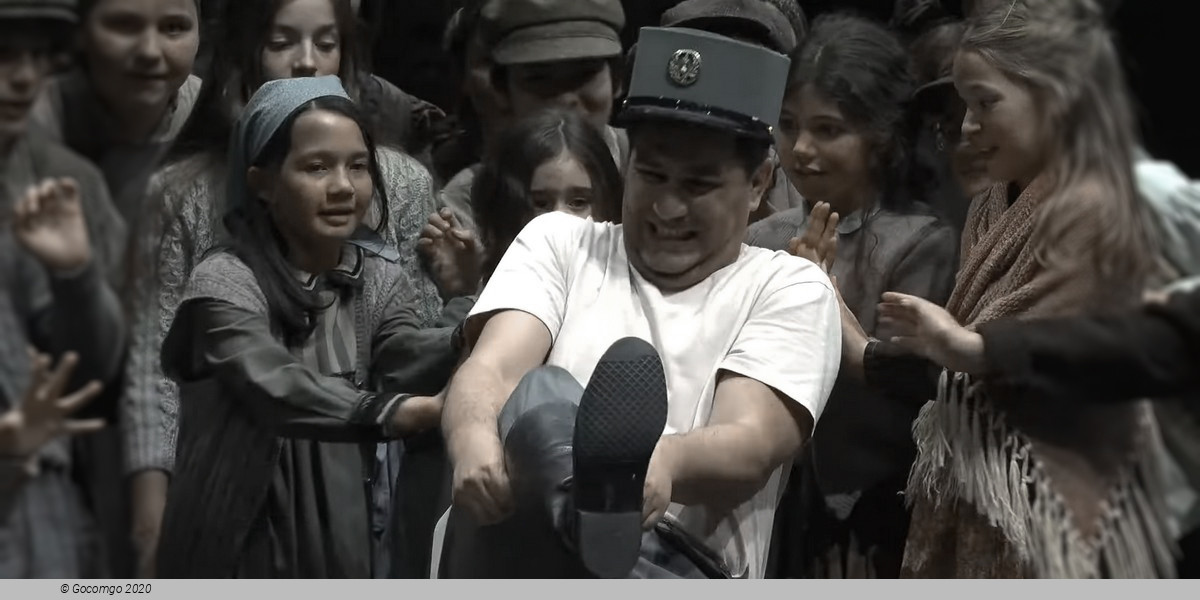
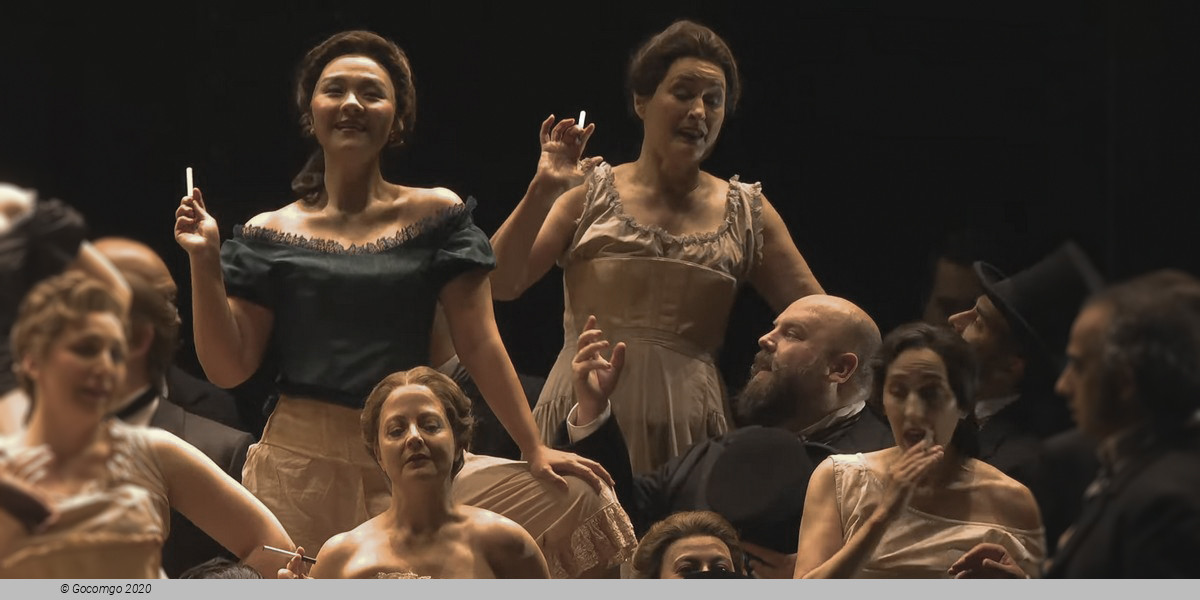
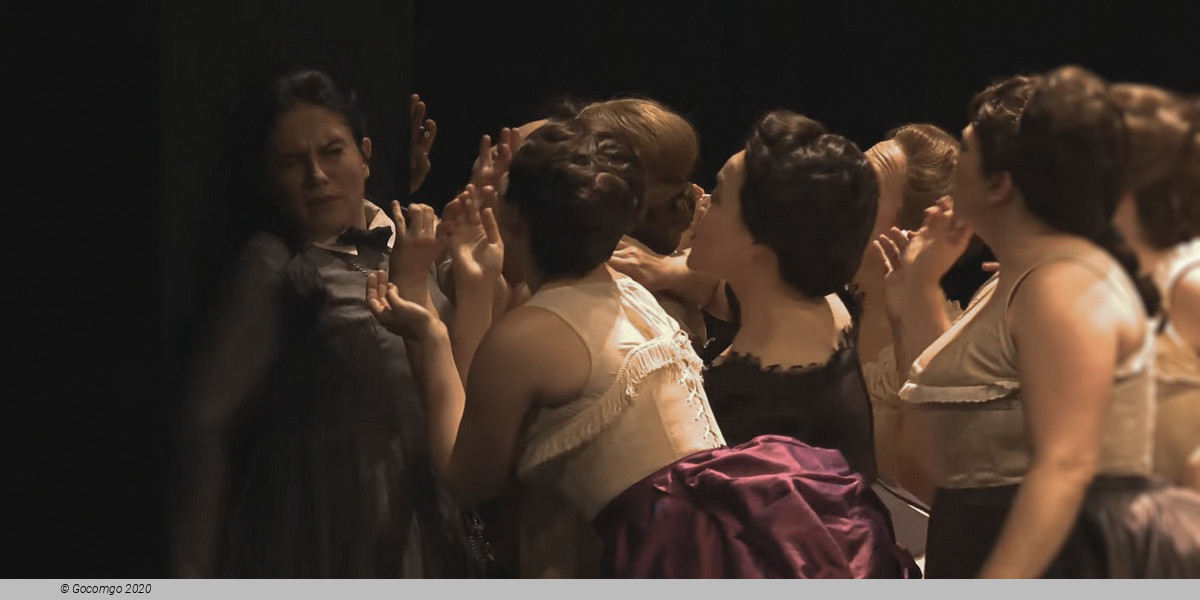
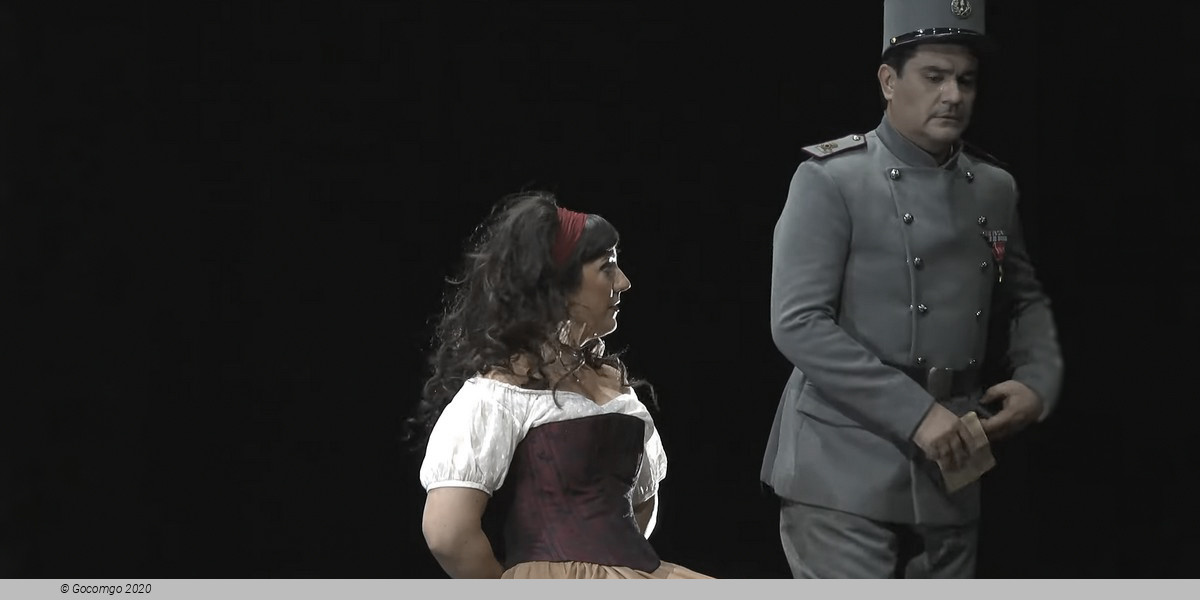
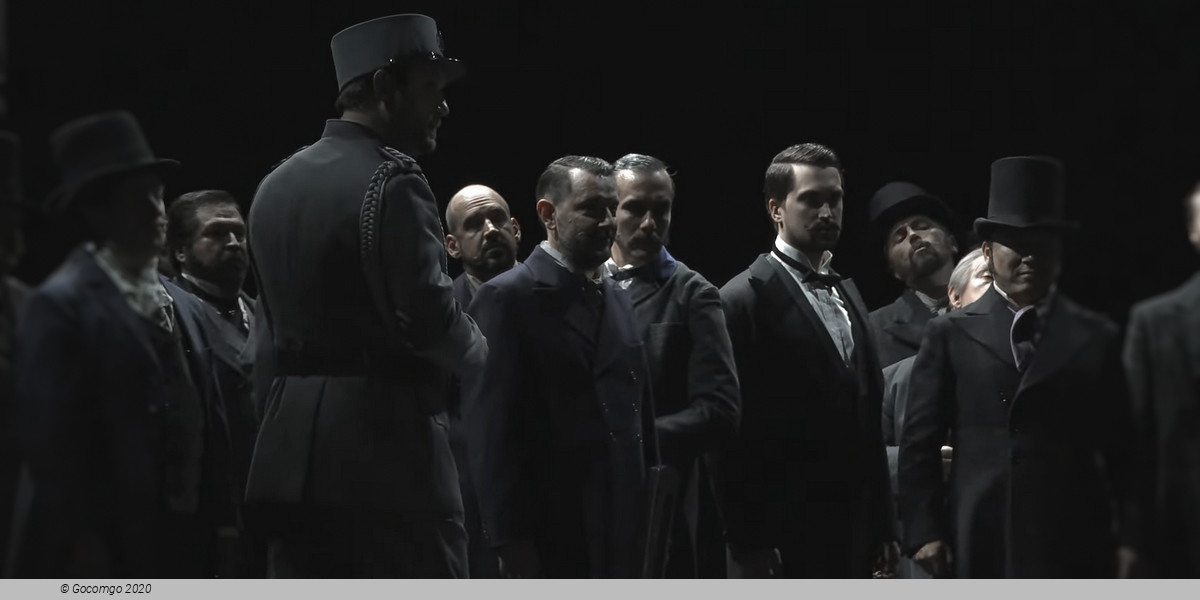
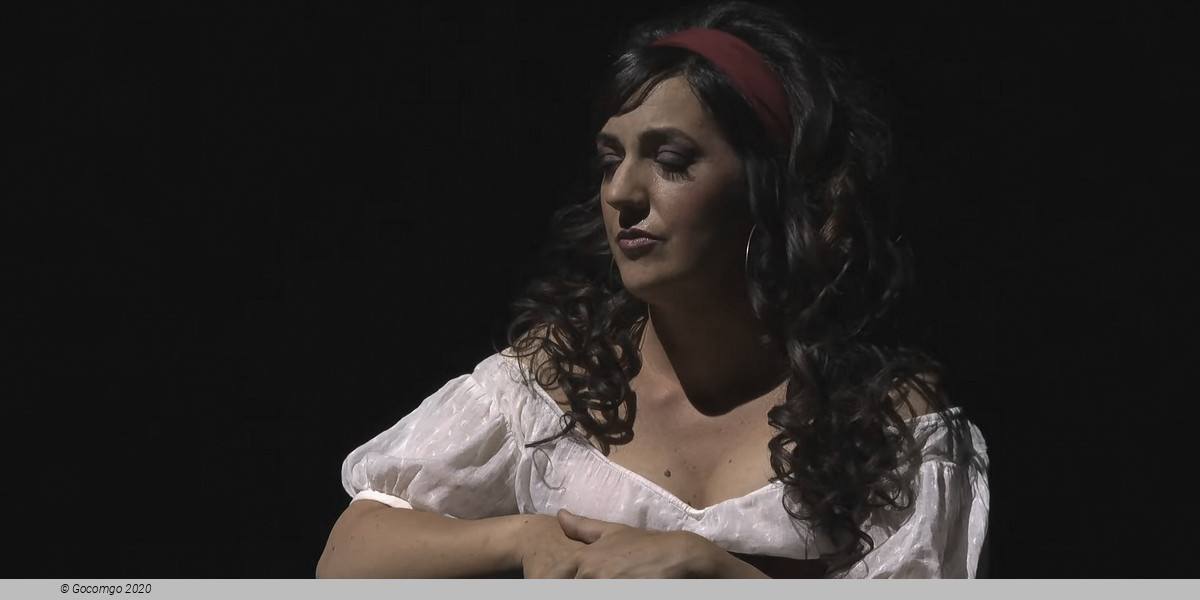
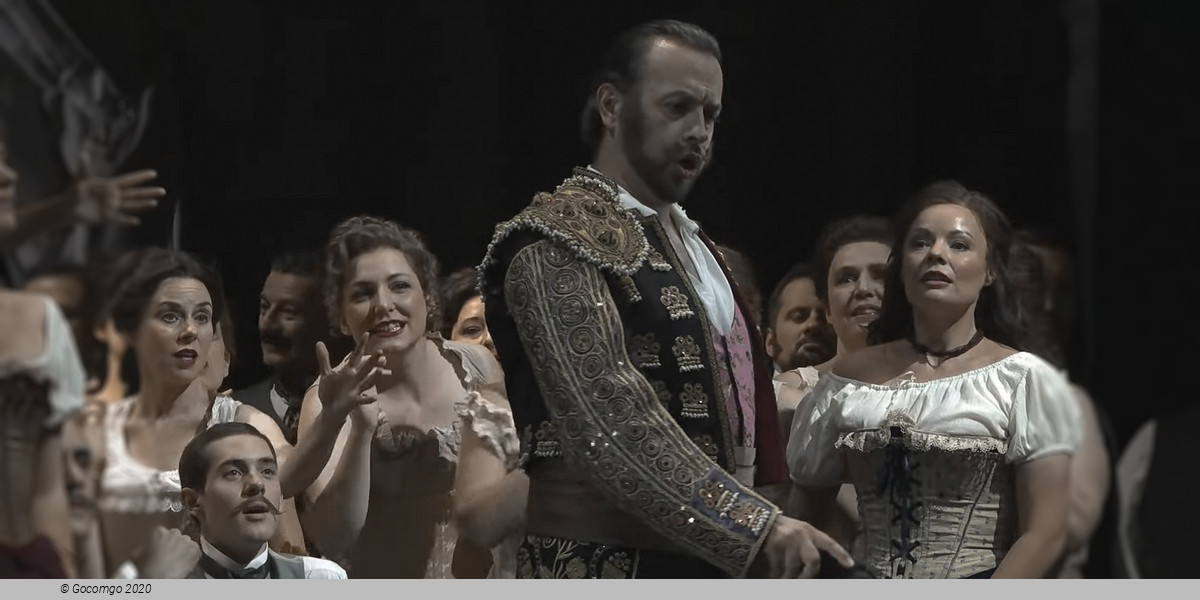
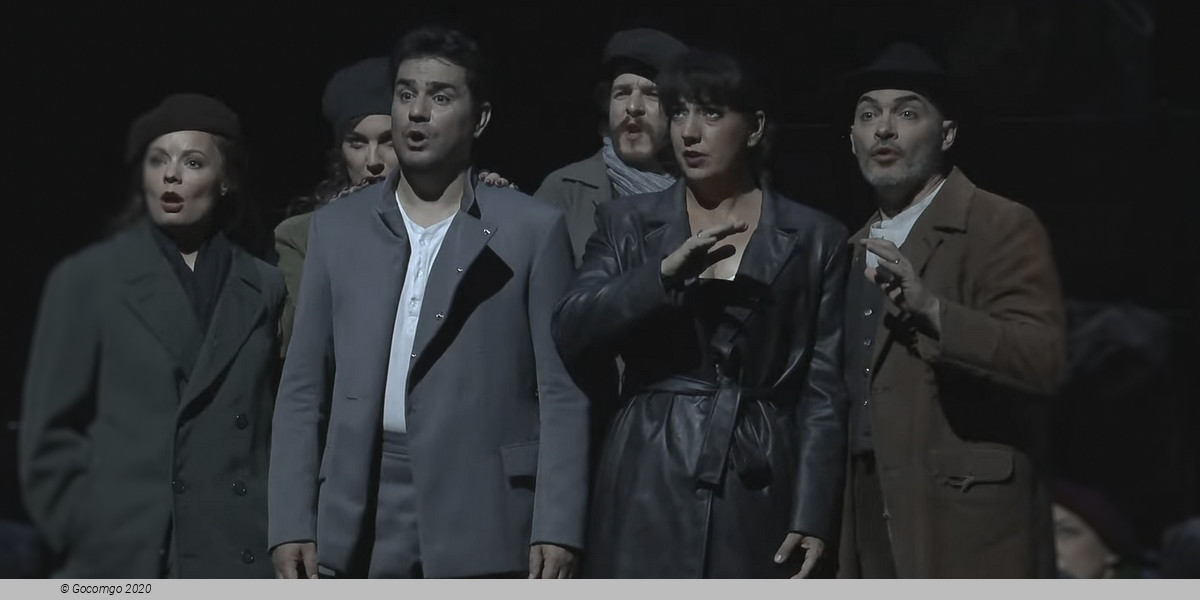
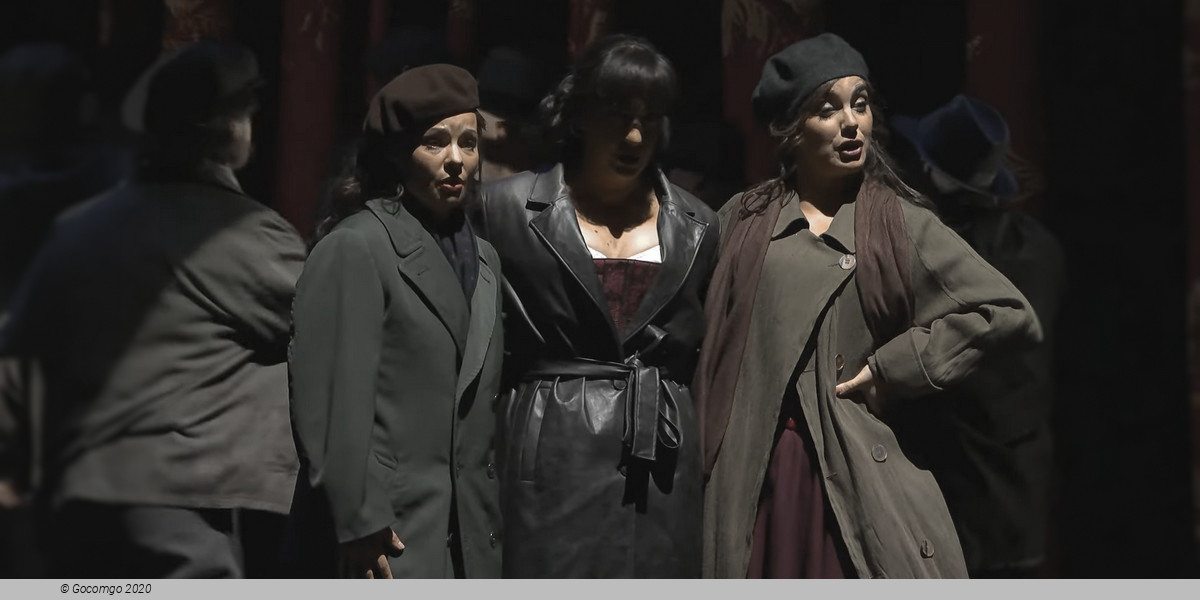
 1 Theatre Square
1 Theatre Square